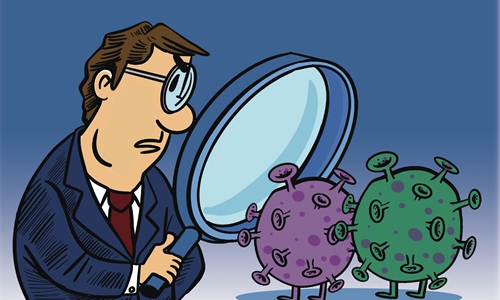Birth of coronavirus still a mystery, blame game needs to be averted
By Wen Sheng Source:Global Times Published: 2020/5/5 19:48:40

Illustration: Luo Xuan/GT
The birth of the lethal COVID-19 remains a mystery, as French virologists have determined a male patient near Paris who was diagnosed with pneumonia on December 27, and actually was infected with the novel coronavirus. This is a stunning scientific find.The Frenchman, in his 50s who has since fully recovered, said he had not been to China, and he told local media that he has no idea where and how he caught the deadly virus in the first place. The man, presumably, got infected with the virus through "community transmission."
French doctors at Avicenne and Jean-Verdier hospitals near Paris went over the files of 14 patients admitted with flu-like symptoms in December and January, and re-tested the previously-kept nasal swabs of the 14 patients. After repetitive tests, one patient's swab came back positive. The hospitals had alerted the National Health Agency, while urging French virologists to re-test swabs kept in their hospitals for the COVID-19.
Earlier, in Santa Clara County, California, local physicians announced that an autopsy confirmed the first coronavirus death in the populous US state happened on February 6.
And, according to a report by Business Insider, a young couple in San Francisco said they were both ill with a fever, dry cough, fatigue and "very oddly restrictive breathing" difficulties - which physicians say bore clear resemblances of the COVID-19 contagion -- in middle December. The couple recovered too.
In a testimony to US Congress in March, Robert Redfield, director of Centers for Diseases Control and Prevention (CDC), said it was possible that the seasonal flu and the novel coronavirus were circulating at the same time, and some COVID-19 deaths had been diagnosed as flu-related in the US.
Like what were ascertained or known to date, China's Wuhan city was on the same timeline as California and Paris reporting the mysterious disease.
On December 31, Wuhan health authorities said the city was treating some cases of pneumonia of an unknown cause, and local physicians could not determine if the pneumonia was readily spread by humans.
At that time, Chinese virologists and public health officials were closely monitoring the disease, in an attempt to get to know its communicability and lethality, and to see if it might develop into something more severe.
About 20 days later, Chinese scientists found the virus to be fairly contagious and deadlier than many variants of the avian flu. To contain its spread, the Chinese government took the draconian move to impose a complete lockdown of the city.
As more places in the world are taking a scientific approach to probe their earliest possible COVID-19 cases, Wuhan city should not be considered as the "definite birthplace" of the new coronavirus, experts say, though the city was first caught with an abrupt and tragic outbreak.
Famed infectious disease specialist Zhong Nanshan and Zhang Wenhong, who advised many countries on ways to stem the coronavirus spread and to cure the infected patients, said Wuhan might not be the origin of the virus. An infected case from anywhere could transmit the disease to the city.
Provided the world's medical scientists keep persistence in pursuing the birth and formations of the coronavirus, truth will eventually come out, illuminating the virus' exact origin.
Countries should not resort to a blame game, or explore conspiracy theories to stigmatize and demonize a place, a city, a country or a group of people.
Only through close cooperation and coordinated scientific research, the origin of the coronavirus' animal host, and the path of its transmission from the host animal to humans can be discovered. And, only via cooperation built on good will, effective medicines and vaccines will be created to combat COVID-19.
The author is an editor with the Global Times. bizopinion@globaltimes.com.cn
Posted in: GT VOICE